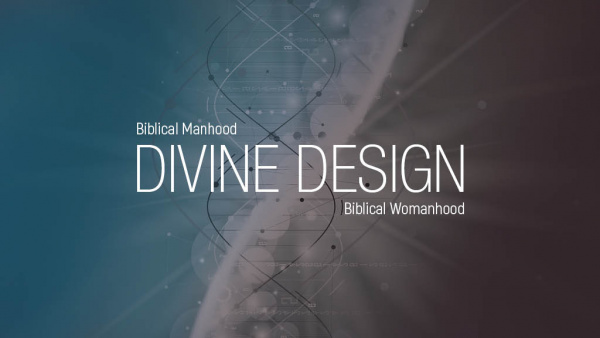Download the PDF study guide version.
Genesis 2:18–24
And the Lord God said, It is not good that the man should be alone; I will make him an help meet for him. And out of the ground the Lord God formed every beast of the field, and every fowl of the air; and brought them unto Adam to see what he would call them: and whatsoever Adam called every living creature, that was the name thereof. And Adam gave names to all cattle, and to the fowl of the air, and to every beast of the field; but for Adam there was not found an help meet for him. And the Lord God caused a deep sleep to fall upon Adam, and he slept: and he took one of his ribs, and closed up the flesh instead thereof; And the rib, which the Lord God had taken from man, made he a woman, and brought her unto the man. And Adam said, This is now bone of my bones, and flesh of my flesh: she shall be called Woman, because she was taken out of Man.
Elisabeth Elliot, wife of missionary-martyr Jim Elliot, made a very powerful observation about femininity when she said, “The Power of a woman does not lie in being equal with men but in being a woman.”
After repeatedly stating that everything He made was “good” (Gen. 1), God makes a surprising statement that “It is not good that man should be alone” (Gen. 2:18). How did Adam come to know he was all alone when he did not know another human being?
First, he would have known it intrinsically or innately. Because Adam was made in God’s image, like the Trinity he was wired relationally and therefore hungered for relationships.
Second, he would have known it experientially. In obeying God’s command to exercise authority over the animals by naming them, Adam observed something was missing—“The man gave names to all livestock and to the birds of the heavens and to every beast of the field. For Adam no suitable helper was found” (v. 20).
The storyline of Gen. 2:18–25 reveals that God gave woman a specific indispensable role that would require a particular response from her.
Biblical Womanhood—Her Role
A woman’s role is found in her ability to do what no man can do—it is a role unique to her and for which she was divinely designed. The term “suitable” refers to someone who is a fitting, corresponding and complementary counterpart to another. The term “helper” refers to the idea of someone serving another by supplying what is needed or missing through the strength and power they have to accomplish the task set before them. Important women in the Bible like Sarah, Rebekah, Ruth, Rahab, Mary and Hannah all exemplified what it means to fulfill roles described by this term “helper.”
Biblical womanhood affirms God’s divine design by embracing the role established for her by God. She gladly accepts the strength of respectful, caring, upright servant-leadership. Biblical womanhood also strengthens, nurtures and enriches relationships by making others stronger and wiser while serving and supplying the needs of others.
Biblical headship is the divine calling of the husband to take primary responsibility for Christlike, servant-leadership, protection and provision in the home. Biblical submission is the divine calling of the wife to honor and affirm her husband’s leadership and help carry it through according to her gifts. Divine design means when we follow this pattern we are most satisfied and God is most glorified.
What about women who are in leadership positions? Should they be in leadership?
Both the Scripture and our own human experience do describe women who serve God in leadership roles. So how does a woman display biblical femininity when she is in a leadership role? Here are some examples: prime minister and her counsellors and advisors; principal and her teachers; college professor and her students; bus driver and her passengers; bookstore manager and her employees; doctor and her interns; lawyer and her aids; judge and her court personnel; law enforcement officer and her citizens; legislator and her assistants and her constituents; TV assignment editor and her reporters; counsellor and her clients.
A woman displaying mature biblical womanhood does not welcome the same kind of strength and leadership from other men that she welcomes from her own husband. However, she will, in some appropriate way, affirm and nurture the strength and leadership of worthy men in all her relationships with men.
When a woman in in these sorts of roles, the issue is not that she has a position of leadership but her disposition of one who serves. Mature femininity will seek to express itself in appropriate ways.
Biblical Womanhood—Her Response
Biblical submission for the wife is the divine calling to honor and affirm her husband’s leadership and help carry it through according to her gifts. It is a disposition to yield to her husband’s authority and an inclination to follow his leadership. This is not absolute submission. The husband doesn’t replace Christ. She should never sin to obey.
The best example of what I am talking about happens on the day of a bride’s wedding. This day is the biggest day of her life—and it is the day where she will willingly, joyfully model the greatest surrender to the man she is marrying.
Biblical womanhood is modeled universally in the wedding ceremony and celebration, but it is lived out even more specifically in the women of our families.
I see this strength modeled and displayed in the women of my own family. These women I love and live with have deep strength and power sourced in and displayed through their womanhood that goes far beyond just being equal with men. “The Power of a woman does not lie in being equal with men but in being a woman.”
Watch Dr. Pettit’s message on biblical womanhood:
Join us for chapel Monday through Thursday at 11 a.m.








